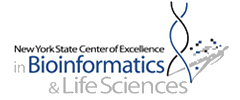ABOUT
THE PROBLEM: A SEA OF INFORMATION
In the last fifty years the development of new technologies and the massive increase in the use of computers in all areas of human activity have led to a veritable explosion in the amount of data that is produced, used, and is in need of management. The problem, then, is to chart this ever-growing sea of information in such a way that it can be efficiently accessed, used, navigated, and reasoned about by human individuals – a problem that the burgeoning sciences of bioinformatics and biomedical informatics are trying to solve.
THE "SOLUTION" AND NEW PROBLEMS
One solution to the problem of navigating the sea of information has been to use computers in setting up databases of information, complete with ontologies that assist in organization and access. 'Ontology' here, means a representation of the entities and relations existing within a particular domain of reality such as medicine, geography, ecology, or law. Ideally, a domain ontology provides a controlled, structured vocabulary to annotate data in order to make it more easily searchable by human beings and more easily processable by computers.
However, extant domain ontologies that categorize, calibrate, chart, and code scientific information are often marked by problems of ambiguity, poor definitions, use-mention confusions, information misappropriation, and faulty analysis of data and misdiagnosis.
FORMAL ONTOLOGY
The basic answer that has been proposed, and is being developed by the OLT and other researchers as a general response to such problems, is formal ontology. The OLT embraces formal ontology, specifically Basic Formal Ontology (BFO), which is focused on the task of supporting ontology development in the scientific domain. BFO is designed to assist in making communication between and among extant computational databases possible by providing a common formal framework for categorization and reasoning. The goal is to create a formal framework so that the calibration of all computer repositories will become possible.
MISSION AND OBJECTIVES
MISSION
The mission of the OLT is to assist researchers in the calibration of all databases, especially biomedical databases, so that they will be more easily searchable by human beings and more easily processable by computers.
Principally, the OLT seeks to achieve this mission by making certain that the terms used when collecting and storing data are internally coherent and well-defined, interoperable between databases, and accurate to the facts of reality as reflected by the current state of our knowledge in a particular domain.
We believe that such calibration can be beneficial for biomedical research and treatment.
OBJECTIVES
- Work with experts in a particular domain to help categorize and annotate the entities of that domain appropriately.
- Ensure that domain ontologies are well-constructed in such a way that their terms do, in fact, designate universals in reality and that the ontology contains an adequate representation of the relations between them.
- Make certain that the terms used in describing data are internally coherent and well-defined, support interoperability of ontologies and data, and accurate to the facts of reality in a particular domain.
- In the biomedical realm, work with the Referent Tracking Unit (RTU), the Qualitative Spatiotemporal Reasoning Unit (QSR), and other groups to improve the diagnosis, treatment, and post-treatment care of patients through the development of new kinds of informatics-based tools to support translational research.
NEWS
Conferences in OntologyHL7 Watch: Latest Discussion
DIRECTOR
 Barry SMITH
Barry SMITH
phismith@buffalo.edu
Phone: (716) 881-7905
Fax: (716) 849-6890
Barry Smith is the Julian Park Distinguished Professor of Philosophy in the Department of Philosophy at the University at Buffalo and Research Director of the Institute for Formal Ontology and Medical Information Science (IFOMIS). He is also Principal Investigator for Dissemination and Ontology Best Practices at the National Center for Biomedical Ontology (NCBO) and editor of The Monist: An International Quarterly Journal of General Philosophical Inquiry.
The author of some 450 scientific publications, including 15 authored or edited books, Smith's research has been funded by the US, Swiss, and Austrian National Science Foundations, the National Institutes of Health, the Volkswagen Foundation, and the European Union.
In 2002, in recognition of his scientific achievements, he received the Wolfgang Paul Award from the Alexander von Humboldt Foundation.
Smith's current research focus is ontology and its applications in biomedicine and biomedical informatics, where he is working on a variety of projects relating to biomedical terminologies and electronic health records.
OLT RESEARCHERS
Along with Barry Smith, other OLT researchers are engaged in foundational ontology analysis and content development, especially in the biomedical domain.
RESEARCHERS IN THE OLT



